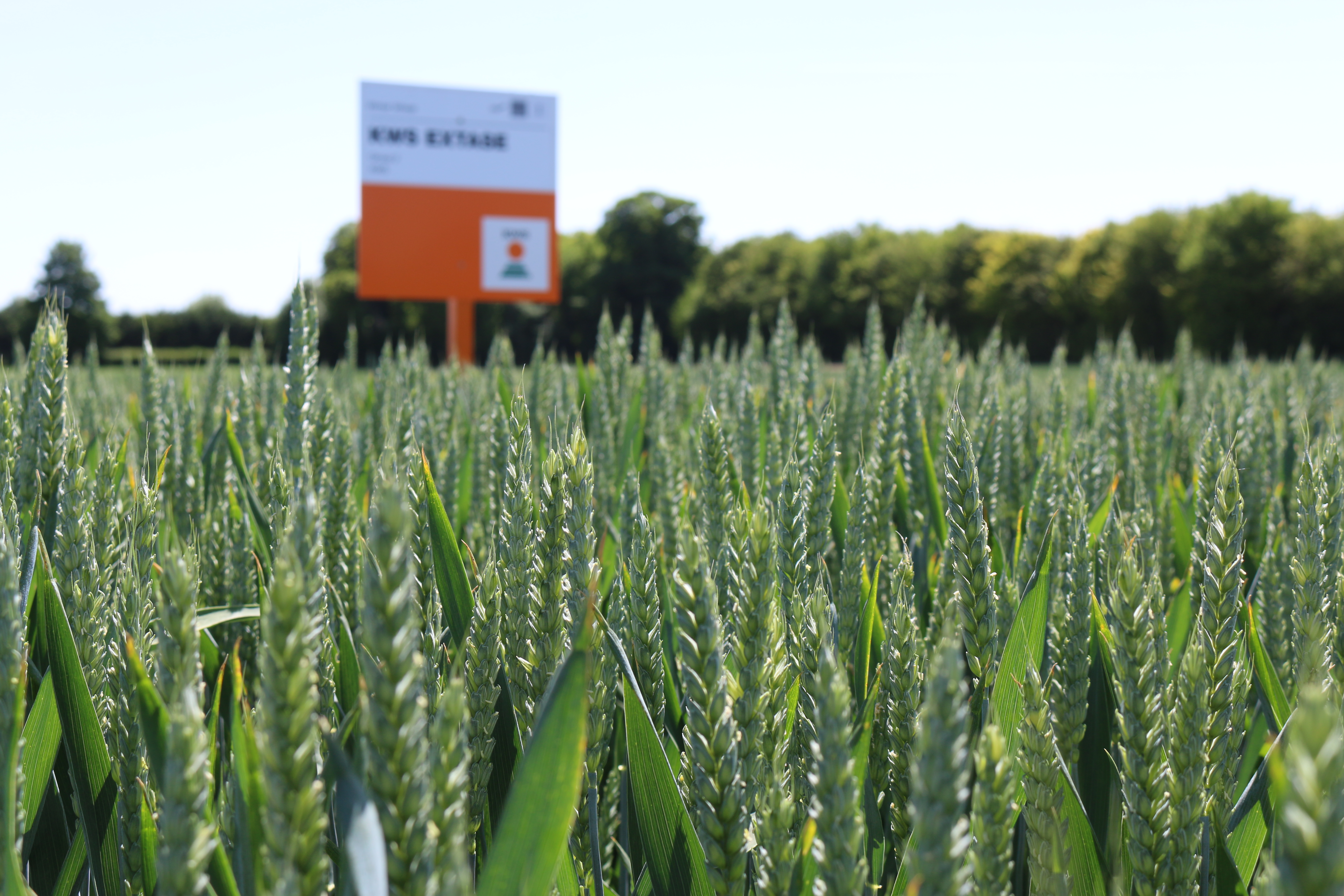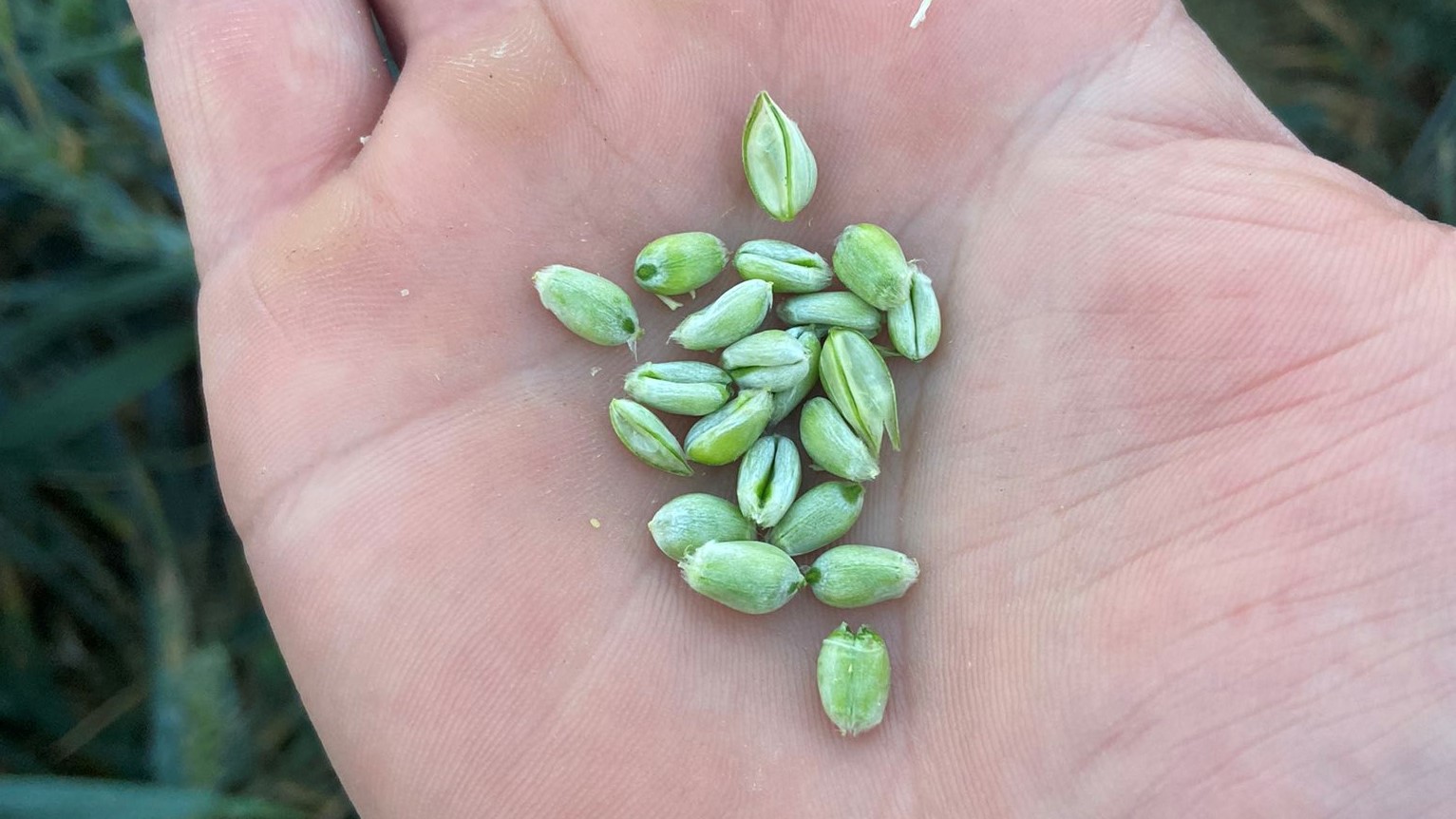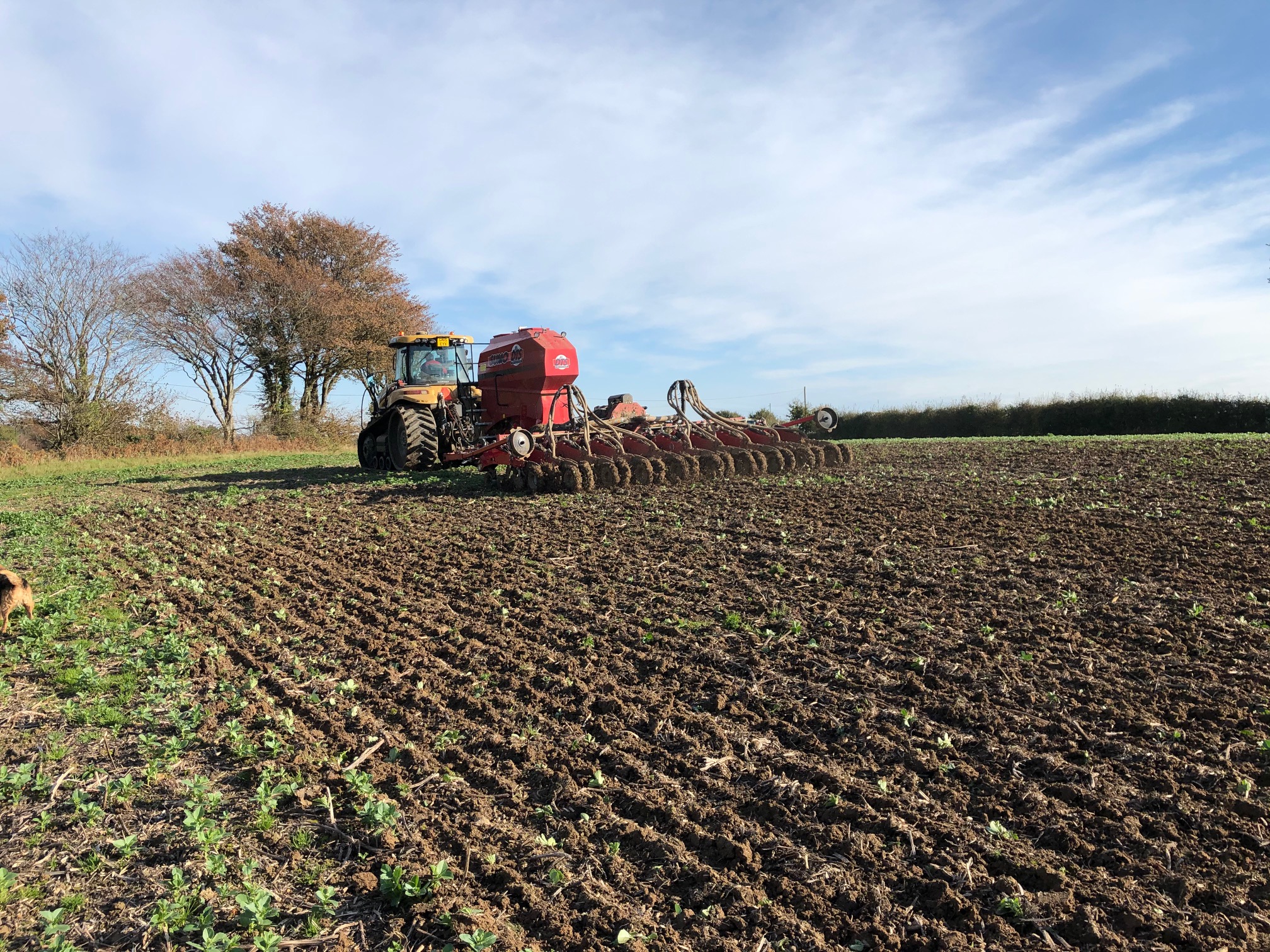Is a Group 2 now the most profitable wheat you can grow?
A superb example of the new generation of wheats capable of combining market value, high yield and outstanding disease resistance, this French-bred, quality variety is performing well across northern Europe, brings new genetics to the UK and is well suited to our growing conditions, she says.
"Setting the gold standard in Group 2, trumping all others for profitability when grown in the right conditions, KWS Extase's proven track record has earned it a place amongst the UK’s most successful milling wheats ever.
"A specific weight of 79.4 kg/hl and HFN of 294 are amongst the highest scores of any recommended breadmaking wheat, while its value is seen in the mill with contracts for 13% protein being readily available, making KWS Extase the outstanding choice in this group.
"Even in 2022, when the extremely hot weather adversely and significantly affected the protein content of many others, millers reported good functionality from this exceptional performer."
KWS Extase has established a new benchmark for Group 2 wheat in the UK, its versatility, favourable agronomic characteristics and performance gaining it a huge following, she points out.
"The variety’s exceptional untreated yield of 97% of treated controls is 2% ahead of the next best performer and owes much to its unprecedented resistance to Septoria tritici.
"When initially recommended it was the first ever to be awarded a score over 8.0 and is currently rated 7.8, with an 8 for yellow rust and a 6 for brown rust.
"With stiff, strong straw KWS Extase is one of the earliest maturing varieties on the Recommended List and will hold strong appeal for farms in the East, as well as those looking for complementary varieties to spread the harvest workload.
"Early maturity and good wet-weather disease resistance also supports its appeal in the West and Northern England.
"However, the speed with which variety moves through stem extension is faster than most so growers will want to prioritise it ahead of others when planning spring fertiliser and agchem schedules.
“Early maturity is a key characteristic for any milling type to ensure that grain quality is preserved, especially in a catchy harvest. Therefore care must be taken in planning sowing to take the biggest advantage of its earliness.
"We suggest sowing KWS Extase from 1st Octpber onwards, depending on your region, after varieties like KWS Palladium and Ultimatum.
“Since 20 May 2020 growers have no longer been able to apply Chlorothalonil™, which has put a hole in Septoria control for many. Increasingly, good genetics are a key part of the solution which is why for many KWS Extase is the variety of choice."
Setting the gold standard in Group 2, trumping all others for profitability when grown in the right conditions, KWS Extase's proven track record has earned it a place amongst the UK’s most successful milling wheats ever.
If further reasons to grow KWS Extase were needed, it is also the only Group 2 variety to be supported by a buy-back contract for full milling specification through to lower protein flours by many national millers, she points out.
"Its milling performance is confirmed by the numerous 13% protein contracts available from end-users such as Heygates or ADM, and for those who secure one of those no other wheat will touch KWS Extase for profitability.
“Whilst millers really want 13% protein, milling contracts are available down to 12%, opening the door for other Group 2 options, particularly in certain regions of the UK where they could outperform KWS Extase.
“Growers interested in Group 2 should start their selection process by looking at KWS Extase.
"Key considerations will be the availability of good milling contracts nearby and whether this variety is right for their location, as its rapid growth habit does not suit early drilling or very fertile soils.
“Many will choose KWS Extase for its combination of good septoria control with high untreated yields which gives flexibility around spray windows, but they should also consider the regional yields and performance of two other KWS Group 2 varieties, KWS Palladium and KWS Ultimatum.
"Just like KWS Extase, both have extremely high untreated yields and bring real flexibility in terms of their management.”
KWS Palladium is the new an exciting addition to the UK domestic bread market. A super-clean variety with one of the highest untreated yields available it is potentially an excellent alternative, Kirsty Richards explains.
"Superb on heavier land it delivers a solid second wheat performance, particularly where the focus is on premium markets.
"It is also a great all-round wheat for eastern areas of the UK and the best Group 2 for early drilling, thanks to its very stiff straw.
KWS Ultimatum brings the high untreated yield performance growers have come to expect from the KWS Group 2 stable along with excellent grain and field performance, she adds.
Added to the 2023/24 Recommended List, it achieves a commendable yield (101% of controls for the whole of the UK), fractionally behind KWS Extase, rising to 103% in the North.
"Delivering impressive performance in the second wheat spot, where 60% of milling wheats and 40% of wheat overall is grown, KWS Ultimatum yields 102% of controls and performs equally well on heavy or light soils.
"Its excellent untreated yield, 93% of controls, is just behind KWS Extase and supported by a first-rate disease package which includes a 9 for yellow rust and a 6 for brown rust, giving a better combination of rust resistances than similar varieties. Eyespot and Fusarium resistance, at 5 and 7 respectively, are also extremely strong, a 7 for Mildew adding to its appeal for Northern growers.
In terms of quality, KWS Ultimatum has the best resistance to sprouting in the breadmaking sector, an especially important trait for growers aiming to achieve premium specifications and those in tougher microclimates.
"The variety delivers a protein content of 12.3%, a Hagberg Falling Number (HFN) of 287, a specific weight of 79.6 kg/hl and has been rated as Group 2 by the UK Flour Millers, with the bonus of UKP Export status.
"If a premium is available KWS Ultimatum can help growers to take advantage of that, but, as with KWS Palladium, in certain regions their high yield and specific weight often makes them a better bet as feed wheats than many competitors.
"In Scotland, this new variety may be an even better choice than KWS Extase because it delivers great yields in the north, far higher than some of the Group 4s, and offers excellent resistance to sprouting combined with strong Fusarium resistance.
KWS Extase ticks all the boxes
Speed of development from late drilling and disease resistance are the main reasons why Brixworth Farming in North Northamptonshire has gone into KWS Extase in such a big way over the last three years.
“It just ticks so many boxes and, as the current mainstay variety, accounts for fifty per cent of our 650ha of wheat,” says Ian Matts, managing director of this innovative and growing business.
A joint venture company, Brixworth Farming supplies the labour, machinery and crop marketing solutions for 2000ha of arable land in the county, operating up to eight miles in each direction from Brixworth, north to Loddington near Kettering and south to Little Brington near Northampton.
Historically, the rotation comprised wheat, oilseed rape, wheat and beans, but more recently has been extended with the inclusion of more spring crops.
Still cereals-heavy, it currently covers winter wheat, winter barley, winter beans, oilseed rape for the first time in four years, spring barley, spring oats and canary seed as a break.
A tailored approach
BASIS and FACTS certified, Ian is keen to make best use of precision farming, combined with the careful selection of varieties and tailored use of inputs to deliver optimum, sustainable, economic yields.
“In the early days, our approach was to use one-pass cultivations, drill and then rely on chemistry to address any issues, he explains.
"Around 2013 we started to see a build-up of blackgrass and subsequently moved towards the greater use of reduced cultivations, began researching cover crops in 2015 and have been evaluating catch crops for the last three years.
“Delayed drilling produces the best outcomes in terms of controlling blackgrass but can be challenging on our mostly heavy clay Hanslope series soils.
"Autumn 2019/2020 was a good example of that; it only took one weather event to go from a ‘can drill’ to a ‘can’t drill’ situation, so we are extremely careful when scheduling our workload.
“One of the best tools we have found for reducing blackgrass is to grow a vigorous, high tillering winter wheat which produces a high level of soil cover.
"Currently we have the Group 2 KWS Extase, the hard Group 4s KWS Dawsum and Gleam, together with the Group 3 soft milling wheat LG Astronomer.
“Gleam always looks like it is struggling and never fills me with confidence but has always performed well for us. KWS Extase (Boisseau x Solheio) is a complete contrast, a big, beefy, smothering variety that has been fantastic in all situations, can be drilled late and is early to harvest.
“We first grew KWS Extase three years ago based on its Recommended List performance, the fact that it did not have Cougar in its parentage, and because its untreated yield was the best (97%).
"That is important because I like to see how varieties perform with and without chemistry.
“The robust all-round disease package which KWS Extase provides and the variety’s exceptional Septoria tritici resistance (7.8) are also big considerations in its favour.
"Last year it was the only winter wheat not to get a T0 and the only one where we did not need to control yellow rust, but nevertheless it looked good throughout the season.
“Our target yield across all winter wheats is 10t/ha, although last year’s very dry weather brought the five-year average down slightly to 9.5t/ha.
"KWS Extase was towards the top of our forecast and whilst it was not the top performer in terms of yield, it did produce the second highest gross margin, even though we do not specifically grow KWS Extase to achieve a Group 2 premium.
Due to the high price of Nitrogen and uncertain level of premium the business has stopped growing Group 1 wheats and with no standout varieties in Group 3, the focus is now on Group 2s and soft Group 4s, Ian explains.
"We work closely with our grain buyer, Charles Jackson & Co at Long Buckby, and focus on growing varieties which we both believe will find a good place in the market.
"KWS Lili (KWS Horizon x CPBT W134) and KWS Siskin (KWS Sterling x CPBT W134) have been grown in the past but not specifically for the Group 2 market.
'We do not forward contract, but all the KWS Extase produced to date has achieved a premium and like most of our Group 2 wheat has ended up in Shredded Wheat."
Flexibility is key
“When it comes to drilling, we do not target any specific dates and KWS Extase is very flexible in terms of its sowing window.
"We have drilled it direct using our Horsch Sprinter or following a light cultivation to establish a catch crop of mustard which has then been sprayed off. Because of its vigorous growth habit, by harvest KWS Extase had caught up with earlier sowings.
"You do not get penalised for drilling this variety late, but from a blackgrass control point of view the second week of October is ideal.
“KWS Extase has been fantastic following beans and after a catch crop because the soils were in good condition and the roots went deep, which allowed us to reduce Nitrogen use by an average of 40kgN/ha.
"Last year on winter wheat we went from 220kgN/ha, as a liquid split 80kgN/ha, 100kgN/ha, plus a top-up, down to nearer 180kgN/ha.
"We have significant data from the KWS/Yara Nitrogen response trials on our farm and that is extremely helpful in determining the optimum amount to apply.
“All our current winter wheats were drilled by 25 October with a Horsch Sprinter or Vaderstad Rapid depending on the situation.
"We drilled KWS Extase in three blocks, two after beans and cover crops, and one following spring oats. Despite the wet autumn all fields walked extremely well and in a season of high disease pressure the KWS Extase has looked good throughout."
None of the business' wheats received a T0 and no issues were experienced with yellow rust but subsequently applied Ascra Xpro (Bayer) at T1 and Univoq™ (Corteva) or Revystar® XE (BASF) at T2, he recalls.
“Fifty per cent of our estimated wheat and barley production was sold forward last autumn. KWS Extase accounts for 50 per cent of our wheat area and that is about the most of any variety we feel comfortable growing.
"As a team, we are currently planning for next year and working out what is best to grow for our customers and our business, taking account of how varieties perform across the wide range of soils we farm.
“Overall performance and season-to-season reliability are critical in selecting the right varieties, so we invest a great deal of time and effort to arrive at a robust selection.
"Having an agronomy background is certainly extremely helpful in understanding the nuances of each variety and achieving the best results.
“As an agronomist, I often see growers getting too hung up on chasing minor yield differences between varieties on the Recommended List but losing sight of the bigger picture.
"The ability to deliver good yields reliably is even more important at a time when margins are under significant pressure and the price to pay for getting things wrong can be extremely high."
From a marketing perspective, KWS Extase is very versatile and provides numerous options, which is why Viterra trades significant volumes of this variety at 13% and 11% protein, as well as a feed wheat.
Highly versatile variety
According to Tom Eaton, Trading Manager for Viterra UK, KWS Extase is a very versatile variety which stands up so well as a complete overall package.
"It's very easy to see why it has become extremely popular with growers and now accounts for such a high percentage of the UK winter wheat area," he says.
Part of the Viterra Group, the business is one of the UK’s largest fully integrated agriculture networks.
Sourcing grains, oilseeds, pulses and oats from producers across the United Kingdom it supplies all the country’s major consumers, from millers to maltsters and crushers to compounders.
“From a marketing perspective, KWS Extase is very versatile and provides numerous options, which is why Viterra trades significant volumes of this variety at 13% and 11% protein, as well as a feed wheat," Tom points out.
"Not all millers use KWS Extase at the full 13% protein, 250 Hagberg, 76kg/hl milling specification, but in recent months consignments which meet these criteria have achieved a £50 per tonne premium over feed.
“Currently, some attractive forward contracts are available for 2024 harvest and as of mid-June 2023 growers can sell KWS Extase which meets full milling specification at that level of premium.
"With no new Group 1 varieties coming through there is a strong case for growing the variety and we expect more farming businesses to take up those offers.
“Those who do not want to target 13% protein from KWS Extase can still achieve a £10 per tonne premium for 11% protein from domestic miller.
"That specification also ticks the box for ukp exports - 76kg/hl/250 Hagberg/11.0-13.0% protein – but because of the shortage of protein in the UK not much has been shipped to traditional markets such as Spain and Portugal this season.”
George Mason, Senior Executive at Heygates, adds: “Since issuing the buy-back contracts in 2019, we’ve been pleased with the response from growers who have made commitments going forward.
"There are ample opportunities to make a quality premium, even at low protein. Our contracts are for either for full spec 13% with fallbacks down to 12%, or minimum 11.5% protein with fallbacks to 11%.”
Chris Jackson, Grain Trader at Charles Jackson & Co Ltd Cereal products, comments: “Farmers seem very pleased with KWS Extase as a variety and how it has the potential for a variety of different markets, depending on the protein levels it achieves.”


